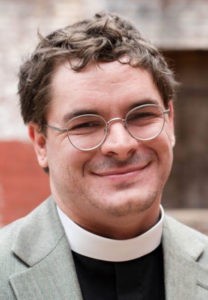Clergy have been called many things through the ages. We are the “chief among sinners,” after all.
In some ways my own ordained ministry has been guided by the wisdom of my graduate advisor at Duke Divinity School, Bishop Will Willimon. Will has a very deep and abiding theology of ministry based on his years in the academy and in the parish — and I can’t forget the nagging reminder he would often give that as clergy it is our job to “remind the church of her story.”

Rob Lee
The past two years I have served Unifour Church — that has played out in the role of chief curator — it has been my job to remind the church of who it is and who God has called the church to be. It has been telling the story in sermons and in teaching, in pastoral care and in administration.
Yet none of us could have predicted how a global pandemic that took its toll this past year could have rocked our conception of what church should be for the world. As that pandemic has begun to subside at least some in the United States, the church is at a crossroads. For clergy, that means we are at a crossroads as well.
Perhaps it is time for us to move from telling the story to encouraging the story. Are we called to be chief encouragers? Perhaps it is not our job to curate the museum of saints but instead offer encouragement at the rehab center for sinners. If we are encouragers for the work and mission of the church, we move from outside force to active participant in the work of the congregations we love.
As someone who has had wonderful clergy mentors, I know the people who call me to be my best self are encouragers. They remind me to throw everything at the wall and see what will stick; they remind me when all hope seems lost to be of good courage and have faith in the mission we’ve been told since before time began — God does not forsake us.
The story of clergy is to be a testament to that encouragement. After all, clergy should be witnesses to what we have seen and heard, as it has been told unto us.
“I know the people who call me to be my best self are encouragers.”
None of us have the certainty of how this will all play out, but if we trust in the work of God, we know that God will bring all this to completion for the sake of the day of our Lord Jesus Christ. There is no need to curate that which is still living, there is no need to bury that which is not dead. The church may be smaller than it once was, but if your church is anything like mine, you are sensing the movement of a leaner but agile and fiercely resilient congregation.
I was ordained five years ago, and the preacher for the day said if I wasn’t paying attention to the state of the church, I was naïve to enter the ministry. The church is in a precarious position. But in my reading of Scripture God does God’s best work there.
We need only encourage the people of God to be blissful participants in their future. We have our work cut out for us.
Rob Lee is the author of three books and pastor of Unifour Church in Newton, N.C. A graduate of Appalachian State University and Duke Divinity School, he lives in Statesville, N.C., with his wife, two daughters and his poodle.


